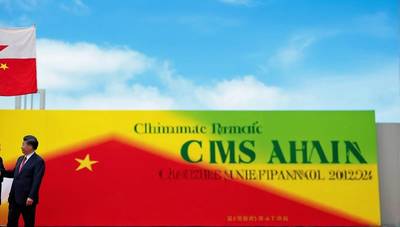China finds bigger role as US sidesteps Brazil climate summit
China has stepped into the spotlight as a leader of the global warming fight, with the United States missing the U.N.'s annual climate summit in New York for the first three decades.
The country's pavilion dominates the entrance of the sprawling COP30 grounds in Brazil’s Amazonian city of Belem. Executives from its largest clean energy companies present their visions of a greener future in English to large audiences, while its diplomats work behind the scenes to facilitate constructive discussions.
Washington used to play these roles. Now, they are played by Beijing.
Francesco La Camera is the director general of the International Renewable Energy Agency. He said that diplomacy and water often follow the same path.
He said that China's dominance of renewable energy and electric cars bolstered its position in climate diplomatics.
China's shift from being a silent presence at the U.N. Conference of the Parties summits, to becoming a central player seeking the attention of the world reflects a change in the global warming fight since U.S. president Donald Trump returned to office.
Trump, who has long been a skeptic about climate change and the need to curb global warming, has once again removed the United States from the historic international Paris Agreement. For the first time, Trump declined to send a high-level official delegation to represent U.S. interest at the summit.
Taylor Rogers, White House spokesperson, said that President Trump would not compromise the economic and national security of our country to achieve vague climate goals that kill other countries.
Critics warn that the U.S.'s withdrawal from the process will cede valuable ground to China in climate negotiations. China is currently the top emitter of greenhouse gases and has rapidly expanded its renewable energy and electric vehicle industries.
Gavin Newsom, the California Governor, said that China "gets it" during his visit to this conference earlier in the week. "America will be toast in the competitive arena if we do not wake up and see what China is doing, especially on supply chains. They are dominating manufacturing.
BEAUTIFUL WORD
China's COP30 Pavilion occupies prime real estate near the entrance, next to Brazil, unlike previous years when it had a modest booth with only a few seats for mainly technical and academic panel discussions.
The event will feature cups of single-origin sustainable Chinese coffee, panda-shaped toys and other branded merchandise to attract passersby. They can also watch presentations from Chinese officials and executives representing the largest renewable energy companies in the world. Meng Xiangfeng said to an audience that "let's honor and fulfill the Paris Vision guided by the vision shared future" Meng Xiangfeng is the vice president of China’s CATL - the world’s largest battery manufacturer.
"Let's build a beautiful, clean world together and advance climate cooperation." Battery giant supplies one third of the batteries used by EV makers such as Tesla, Ford and Volkswagen. CATL hosted its first event at the COP in order to reach out to governments and NGOs.
Li Gao, China's Vice Minister of Ecology, told an audience of hundreds earlier that afternoon that China's position as the world leader in renewable energy "brings many benefits, especially to the Global South".
Trina, Longi, China's State Grid and China's State Grid - the world's biggest electric utility - also gave presentations.
BYD, the Chinese electric automaker, introduced a fleet plug-in hybrids compatible with biofuel produced at its Bahia plant in Brazil for use at COP30.
Ana de Toni, CEO of COP30 and COP30 President Andre Correa do Lago have both praised China for its role as a leader in clean energy technologies.
De Toni said, "China has demonstrated leadership by not only implementing its own energy revolution but also by allowing us to buy low-carbon... products at competitive prices."
"China is determined to not only continue to be the leader of the Paris Agreement and strengthen climate governance but also take very practical measures to support other nations."
Behind the Scenes
According to former and current diplomats, China plays a subtler role in the negotiations, filling the void left behind by the United States. The United States was known for rallying countries toward agreement.
One senior diplomat of a developing economy said, "Little-by-little, China is acting in a guaranteeing role for the climate regime." "They have invested heavily in the green economy." They will lose if there is any sort of change. A Brazilian diplomat stated that China was instrumental in reaching an agreement on the COP30 Agenda before any negotiations began. In previous years, its diplomats wouldn't get involved unless they had a major issue to discuss.
Sue Biniaz was the U.S. deputy envoy for climate change under John Kerry, and a key architect of Paris Agreement. She said that China has the ability to bring the diverse interests of developing countries together, from the major emerging economies such as the BRICS, to the small developing nations. She worked closely alongside Chinese counterparts to develop four bilateral climate agreements including the agreement that led to the Paris Agreement.
She said, "They are very aggressive, they take positions that are tough like the U.S., but at the end, they become pragmatic." "They must come up with a solution that no one can block."
Biniaz stated that she is not convinced yet that China plays a leading role beyond the pavilions.
She said that if they wanted, they could have set a more aggressive emission reduction goal. She was referring to China’s announcement made in September, which stated it would reduce emissions by at least 7% compared to their peak levels by 2035.
Li Shuo is a veteran China observer at U.N. Climate talks and heads the China Climate Hub of the Asia Society Policy Institute. He countered by saying that China's technological position was already an example of political leadership, because its companies made U.N. commitments possible.
He said that the most powerful country was not the one who had the loudest voice at the COP, but the one which invested in and produced low-carbon technologies. Reporting by Valerie Volcovici in Belem and Lisandra paraguassu, edited by Richard Valdmanis & Nia Williams
(source: Reuters)




